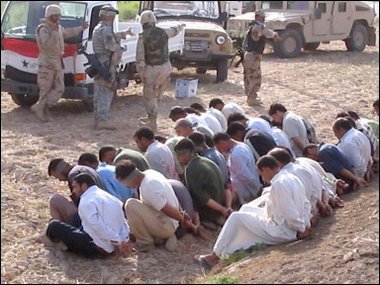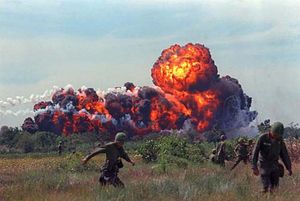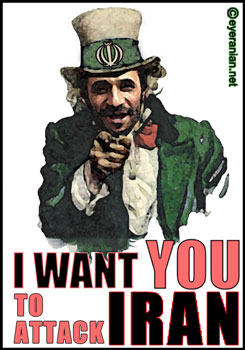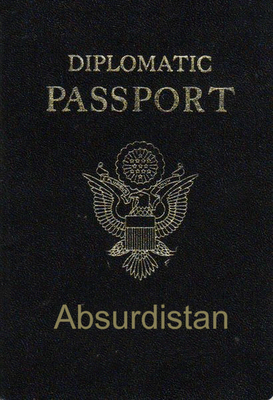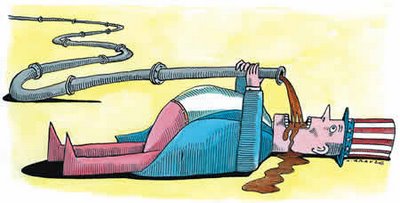John Dean: Neocon Fearmongering and its Consequences

The following was posted on one of my favorite internet forums. It's a great excerpt from John Dean's latest critique (that's probably far too gentle, 'skewering' is probably more appropriate), of the Bush administration, Conservatives Without Conscience
"Any who act as if freedom's defenses are to be found in suppression and suspicion and fear confess a doctrine that is alien to America."
--President Dwight Eisenhower
The following is an excerpt from John Dean's latest book Conservatives Without Conscience and is one of the best summations of this particular political phenomenon as it applies to the current administration that I have seen.
Among the most troubling of the authoritarian and radical tactics being employed by Bush and Cheney are their politics of fear. A favorite gambit of Latin American dictators who run sham democracies, fearmongering has generally been frowned upon in American politics.* Think of the modern presidents who have governed our nation--Roosevelt, Truman, Eisenhower, Kennedy, Johnson, Ford, Carter, Reagan, Bush I, and Clinton--and the various crises they confronted--the Great Depression, World War II, the Korean war, the cold war, the Cuban missile crisis, the war in Vietnam, Iran's taking of American hostages, the danger to American students in Grenada, Saddam's invasion of Kuwait, the terrorist bombings at the World Trade Center in 1993, and Timothy McVeigh's 1995 bombing of the federal building in Oklahoma. None of these presidents resorted to fear in dealing with these situations. None of these presidents made the use of fear a standard procedure or a means of governing (or pursuing office or political goals). To the contrary, all of these presidents sought to avoid preying on the fears of Americans. (It will be noted that Nixon is not included in this list because he did use fear in both his 1968 and 1972 presidential campaigns, and he continued to use this tactic once in office.)
Frightening Americans, nonetheless, has become a standard ploy for Bush, Cheney, and their surrogates. They add a fear factor to every course of action they pursue, whether it is their radical foreign policy of preemptive war, their call for tax cuts, their desire to privatize social security, or their implementation of a radical new health care scheme. This fearmongering began with the administration's political exploitation of the 9/11 tragedy, when it made the fight against terrorists the centerpiece of its presidency. Bush and Cheney launched America's first preemptive war by claiming it necessary to the fight against terrorism. Yet it is almost universally agreed that the war has actually created an incubator in Iraq for a new generation of terrorists who will seek to harm the United States far into the future. Even well-informed friends of the Bush administration have adopted this view. Senator John McCain, in a 2004 speech to the Council on Foreign Relations, expressed his concern that we had "energized the extremists and created a breeding ground for terrorists, dooming the Arab world" in Iraq,84 and former National Security Adviser (to Bush I) Brent Scowcroft bluntly said of the war in Iraq, "This was said to be part of the war on terror, but Iraq feeds terrorism."85
------
*For example, President Alberto Fujimori manipulated the people of Peru for electoral gains and to justify authoritarian practices in 2000 by using the threat of terror. "Elitists and dictators have used fear tactics to control their constituencies since the beginning of time," noted scholar R. D. Davis in "Debunking the Big Lie," in National Minority Politics (November 30, 1995), 37. Chris Ney and Kelly Creedon, authors with expertise on Latin American politics, wrote that "fear won the election" in El Salvador in 2004, noting, "The rhetoric and tactics mirror those employed by other Latin American right-wing parties, including that of former Chilean dictator Augusto Pinochet." They conclude with an observation remarkably applicable to American democracy: "The targeted use of fear is a powerful motivator, especially for people who have been traumatized by war, state terrorism, or economic insecurity. The implications for democratic government whether newly formed or well-established--are deeply disturbing." Chris Ney and Kelly Creedon, "Preemptive Intervention in El Salvador,'' Peacework (May 2004), 15.
------
Among the few who have spoken out against the politics of fear, no one has done so more forcefully, and with less notice in the mainstream news media, than former vice president Al Gore, who was the keynote speaker at a conference in February 2004 titled "Fear: Its Political Uses and Abuses." Gore analyzed the administration's continuous use of fear since 9/11 and expressed grave concern that no one was correcting the misinformation being fed to Americans by Bush and Cheney. "Fear drives out reason. Fear suppresses the politics of discourse and opens the door to the politics of destruction," Gore observed. "President Dwight Eisenhower said this: 'Any who act as if freedoms defenses are to be found in suppression and suspicion and fear confess a doctrine that is alien to America.' But only fifteen years later," Gore continued, "when Eisenhower's vice president, Richard Nixon, became president, we saw the beginning of a major change in America's politics. Nixon, in a sense, embodied that spirit of suppression and suspicion and fear that Eisenhower had denounced." Getting right to the point, Gore continued, "In many ways, George W. Bush reminds me of Nixon more than any other president....Like Bush, Nixon understood the political uses and misuses of fear." While much of the press has ignored Bush's and Cheney's fearmongering, letters to the editor occasionally surface to address it, like the letter from Steve Mavros to the New York Times saying he was "sick and tired of living in fear," yet "President Bush and Vice President Dick Cheney want us to fear everything. Fear the terrorists, fear Muslims, fear gays."86
By and large Bush, Cheney, and their White House media operation have churned out fear with very few challenges from the media. Cheney regularly tells Americans that we are "up against an adversary who, with a relatively small number of people, could come together and mount a devastating attack against the United States," adding, "The ultimate threat now would be a group of al Qaeda in the middle of one of our cities with a nuclear weapon."87 Did the interviewer ask how likely that might be? Or what the government was doing to prevent it or to minimize its impact? No such questions were raised. The Bush White House understands that the media will treat their fearmongering as news, because fear sells news; it keeps people reading, watching, and waiting for updates. There is more fear to come, for the Bush White House is relying on it in their campaign for the 2006 midterm congressional elections. This, in turn, will set the stage for the 2008 presidential election, where authoritarians will make certain fear is a prominent part of the platform.
Bush's top political strategist, Karl Rove, gave the word to the political troops at a meeting of the Republican National Committee in early 2006. "America is at war--and so our national security is at the forefront of the minds of Americans," Rove said, as he rattled the White House saber. "The United States faces a ruthless enemy--and we need a commander-in-chief and a Congress who understand the nature of the threat and the gravity of this moment. President Bush and the Republican Party do. Unfortunately, the same cannot be said for many Democrats."88 I have said little about Rove, principally because this is not a book about the Bush White House. But Karl Rove has all the credentials of a right-wing authoritarian, and if he has a conscience, it has hardly been in evidence during the five years in which he has been in the public eye. He is conspicuously submissive to authority, exceedingly aggressive in pursuing and defending the policies and practices he embraces (namely, whatever George W. Bush believes, or that which is politically expedient), and he is highly conventional. As a political strategist, Rove appreciates the value of fear, so it is not surprising that he proclaimed that the 2006 midterm elections would be won or lost based on how frightened Americans are about terrorism.
A writer for HarperÂs magazine recently collected facts that illustrate the 9/11 terror attack from a "detached perspective," leaving out hot hyperbole by making a cold comparison of hard numbers regarding causes of death in the United States:
In 2001, terrorists killed 2,978 people in the United States, including the five killed by anthrax. In that same year, according to the Centers for Disease Control, heart disease killed 700,142 Americans and cancer 553,768; various accidents claimed 101,537 lives, suicide 30,622, and homicide, not including the [terror] attacks, another 17,330. As President Bush pointed out in January [2004], no one has been killed by terrorists on American soil since then. Neither, according to the FBI, was anyone killed here by terrorists in 2000. In 1999, the number was one. In 1998, it was three. In 1997, zero.* Even using 2001 as a baseline, the actuarial tables would suggest that our concern about terror mortality ought to be on the order of our concern about fatal workplace injuries (5,431 deaths) or drowning (3,247). To recognize this is not to dishonor the loss to the families of those people killed by terrorists, but neither should their anguish eclipse that of the families of children who died in their infancy that year (27,801). Every death has its horrors.89
On a broad base, Jim Harper, the director of Information Policy Studies at the Cato Institute, has observed, "We can compare the risk of terrorist attack to other dangers our country has historically faced: During the height of the Cold War, we drew within a few figurative minutes of midnight--the moment that the Soviet Union and United States would hurl their world-ending arsenals at one another." Harper further noted that "we didn't throw out the rulebook during the Cold War. The executive branch did not make extravagant claims to power," as are Bush and Cheney.90
------
*The total number of fatalities resulting from the 1995 bombing of the Alfred P. Murrah Federal Building in Oklahoma City, Oklahoma, was 168.
------
Despite such realities, the Bush administration continually presents the public with a worst-case scenario. Clearly, the most serious threat from terrorists is that they obtain a weapon of mass destruction (WMD). But we face another very serious threat: namely, that our own government terrorizes us so much that we are willing to give up the ideals of democracy in exchange for reducing our fear. This threat to democracy seems well understood by Osama bin Laden and his troops. I have noted in the past, and I believe even more strongly today, that "the real danger posed by terrorism for our democracy is not that they can defeat us with physical or military force," rather "terrorism presents its real threat in provoking democratic regimes to embrace and employ authoritarian measures that (1) weaken the fabric of democracy; (2) discredit the government domestically as well as internationally; (3) alienate segments of the population from their government, thereby pushing more people to support (passively, if not outright actively) the terrorist organizations and their causes; and (4) undermine the government's claim to the moral high ground in the battle against the terrorists, while gaining legitimacy for the latter."91 This is precisely what is happening in America today, as Bush and Cheney are being sucker punched by Osama bin Laden. Authoritarianism is everywhere in the federal government, not because Bush and Cheney do not realize what they are doing, but because they are authoritarians, and they are doing what authoritarians do. In the process they have weakened the fabric of democracy, discredited the American government as never before in the eyes of the world, caused people to wonder if terrorists have a legitimate complaint, and taken the United States far from the moral high ground in refusing to abide by basic international law.
In citing the worst-case potential of the next terror attack in the United States--a nuclear weapon, a "dirty bomb," or a chemical or biological weapon that could kill or injure millions of Americans--the Bush administration is not making a baseless argument. Such things could happen. But there is much that can be done to reduce the potential, as well as the impact, of a WMD terror attack. It would, therefore, seem logical--if the Bush administration is truly concerned about such a catastrophic terror strike in the United States--for it to focus its efforts on such measures, rather than simply frightening people.
How serious is the Bush administration about addressing the possibility of another major terror attack in the United States? Remarkably, not very. Notwithstanding the level of importance the administration purportedly places on fighting terrorism, according to the 9/11 Commission's 2005 year-end "report card" Bush and Company were given five Fs, twelve Ds, and two incompletes in categories that included airline passenger screening and improvement of first responders' communication systems. The bipartisan members of the 9/11 Commission found that "there has been little progress in forcing federal agencies to share intelligence and terrorism information and sharply criticized government efforts to secure weapons of mass destruction," according to the Washington Post.* "We believe that the terrorists will strike again," 9/11 Commission chairman Thomas H. Kean told reporters. "If they do, and these reforms that might have prevented such an attack have not been implemented, what will our excuses be?"92 When the president and his cohort continue to raise the threat of terrorism but refuse to implement even the minimum measures recommended by the commission, it is clear they are playing the politics of fear. No one knows when, if ever, terrorists will use a weapon of mass destruction in the United States, but using the issue to frighten people while not addressing the 9/11 Commission's concerns is worse than irresponsible; it is cruel.
It appears that most Republicans are content to allow the Bush White House to engage in fearmongering if that is what is needed to win elections. Many contend that terrorism, after all, is a real threat, and they feel safer with Republicans in charge, because they believe Republicans will deal with the issue more effectively than Democrats. Of course, demagoguery is not new; there have always been and always will be politicians who appeal to emotions rather than reason, because it works.
There are, in fact, relatively few people who are truly intimidated by the possibility of terrorist attacks.** Those few who are genuinely frightened, however, help Bush and Cheney. Dr. Jost and his collaborators, in the study reported in Chapter 1, found that fear of terrorism is a useful recruiting tool for Republicans. When the Bush administration reminds people of terrorism, it clearly works to their political benefit. Jamie Arndt, a psychology professor at the University of Missouri, reported,
"Reminders of death create anxiety that causes people to cling to cultural and societal touchstones." Because the president is such a touchstone, "he may benefit from keeping [terrorism] in people's mind," Arndt said.93 This finding is corroborated by public opinion polls. While political exploitation of terror does not make a tremendous difference in voting behavior, it has been sufficient to keep Bush in the White House. At the outset of the 2004 presidential campaign, President Bush was more trusted than Senator Kerry to do a good job protecting the country from terrorists by a substantial margin of 53 percent to 37 percent.94 A CNN exit poll taken at the end of the race, after Bush had repeatedly raised the issue of terrorism, showed that people voted for Bush over Kerry on this issue by a similar--but better for Bush--58 percent to 40 percent margin.95
Fearmongering has serious political consequences. Timothy Naftali, a diplomatic historian at the University of Virginia who worked as a consultant to the 9/11 Commission, is troubled by the ramifications of Bush, Cheney, et al.'s use of fear and their politicizing of policies needed to deal with terrorism. A reviewer for Foreign Affairs noted that in Naftali's view, "the Bush administration's reliance on a 'politics of fear' has stymied a mature national conversation about counterterrorism. He urges the government to keep terrorism at the forefront of its concerns and pursue a pragmatic foreign policy while helping the public put the threat in perspective and evaluate the difficult tradeoffs between national security and civil liberties."96 Al Gore, in his keynote address at the 2004 conference on fear, also noted the consequences of Bush's preying on American fears. "Fear was activated on September 11 in all of us to a greater or lesser degree," Gore observed. "And because it was difficult to modulate or to change in particular specifics, it was exploitable for a variety of purposes unrelated to the initial cause of the fear. When the president of the United States stood before the people of this nation--in the same speech in which he used the forged document--he asked the nation to 'imagine' how fearful it would feel if Saddam Hussein gave a nuclear weapon to terrorists who then exploded it in our country. Because our nation had been subjected to the fearful, tragic, cruel attack of 9/11, when our president asked us to imagine with him a new fear, it was easy enough to bypass the reasoning process, and short-circuit the normal discourse that takes place in a healthy democracy with a give-and-take among people who could say, Wait a minute, Mr. President. Where's your evidence? There is no connection between Osama bin Laden and Saddam Hussein.' At one point, President Bush actually said, 'You can't distinguish between Saddam Hussein and Osama bin Laden.' He actually said that," Gore added, and with disappointment explained how even he had trusted Bush to do the right thing, but that Bush had abused the trust people had in him.97
In short, fear takes reasoning out of the decision-making process, which our history has shown us often enough can have dangerous and long-lasting consequences. If Americans cannot engage in analytical thinking as a result of Republicans' using fear for their own political purposes, we are all in serious trouble. I am sure I am not alone in worrying about the road that we are now on, and where the current authoritarianism is taking the country. I only wish more people would talk about it.
And some more info from the same person who posted the first article:
Dean's book draws on an impressive array of historical facts and empirical evidence to show how the conservative movement in America has been hijacked and is now dominated by authoritarianism, both at the leadership as well as the popular level.
While familiar with some of the early pioneers who have helped us better understand the authoritarian social/psychological/political phenomenon such as Hannah Arendt and Stanley Milgram, I was unfamiliar with DeanÂs references to the more recent work in this area by those such as Bob Altemeyer.
The focus of DeanÂs book is on right-wing authoritarianism as it has expressed itself in the United States. While authoritarianism isn't exclusively a right-wing political phenomenon, empirical evidence demonstrates that it is primarily so. Someone who is an authoritarian personality type is much more likely to also be identified with the political right (as well as the religious right in particular) than the political left.
Recent research by those such as Altemeyer and others end up with the division of authoritarianism into three distinct sub-categories: 1) Social DominatorsÂLeaders; 2) Right-Wing Authoritarian Followers; 3) The very scary Double Highs, i.e., those who score highly on both the Social Dominator as well as the Right-Wing Authoritarian scale.
The characteristics of the above authoritarian sub-categories are as follows (an asterisk represents a required characteristic):
Social Dominators- Leaders:
typically men
dominating*
opposes equality*
desirous of personal power*
amoral*
intimidating and bullying
faintly hedonistic
vengeful
pitiless
exploitive
manipulative
dishonest
cheats to win
highly prejudiced (racist, sexist, homophobic)
mean-spirited
militant
nationalistic
tells others what they want to hear
takes advantage of "suckers"
specializes in creating false images to sell self
may or may not be religious
usually politically and economically conservative/Republican
Right-Wing Authoritarian- Followers:
men and women
submissive to authority*
aggressive on behalf of authority*
conventional*
highly religious
moderate to little education
trust untrustworthy authorities
prejudiced (particularly against homosexuals, women, and followers
of religions other than their own)
mean-spirited
narrow-minded
intolerant
bullying
zealous
dogmatic
uncritical toward chosen authority
hypocritical
inconsistent and contradictory
prone to panic easily
highly self-righteous
moralistic
strict disciplinarian
severely punitive
demands loyalty and returns it
little self-awareness
usually politically and economically conservative/Republican
The real danger to society is when authoritarian leaders (current GOP leadership) team up with authoritarian followers (majority of current GOP base). That's when you end up with creeping political authoritarianism, known also as fascism.
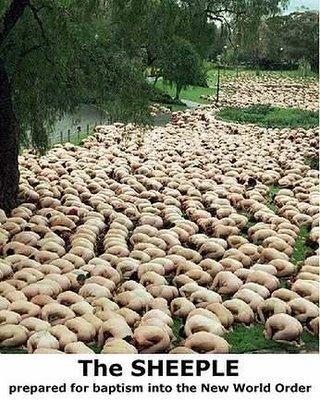
I know more than a little over the top, but the pic is hilarious...and disturbing at the same time. Perfect! ;-)
OK Johnny boy. You've more than made up for that sordid episode covering up for tricky dicky...but keep it coming anyway!



